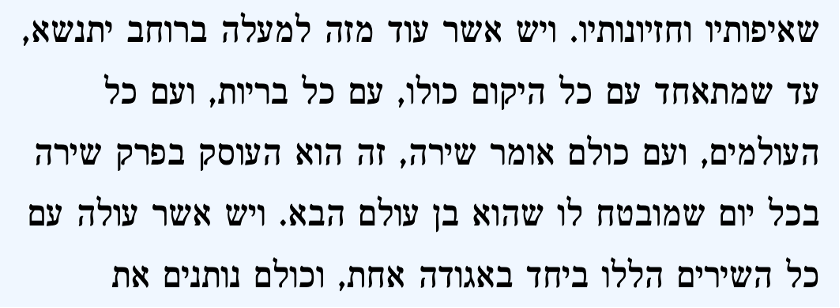There is one who sings the song of his own life, and in himself he finds everything, his full spiritual satisfaction.
There is another who sings the song of his people. He leaves the circle of his own individual self, because he finds it without sufficient breadth, without an idealistic basis. He aspires towards the heights, and he attaches himself with a gentle love to the whole community of Israel. Together with her he sings her song. He feels grieved in her afflictions and delights in her hopes. He contemplates noble and pure thoughts about her past and her future, and probes with love and wisdom her inner spiritual essence.
There is another who reaches toward more distant realms, and he goes beyond the boundary of Israel to sing the song of humanity. His spirit extends to the wider vistas of the majesty of humanity generally, its noble essence. He aspires toward humanity's general goal and looks forward toward its higher perfection. From this source of life he draws the subjects of his meditation and study, his aspirations and his visions.
Then there is one who rises toward wider horizons, until he links himself with all existence, with all God’s creatures, with all worlds, and he sings his song with all of them. It is of one such as this that tradition has said that whoever sings a portion of the song each day is assured of having a share in the world to come.
And then there is one who rises with all these songs in one ensemble, and they all join their voices. Together they sing their songs with beauty, each one lends vitality and life to the other. They are sounds of joy and gladness, sounds of jubilation and celebration, sounds of ecstasy and holiness.
The song of the self, the song of the people, the song of humanity, the song of the world all merge in him at all times, in every hour. And this full comprehensiveness rises to become the song of holiness, the song of God, the song of Israel, in its full strength and beauty, in it full authenticity and greatness.
The name “Israel” stand for shir el, the song of God.
It is the Song of Songs of Solomon, shlomo, which means peace or wholeness. It is the song of the King whom is wholeness.
Rav Kook, "Lights of Holiness", trans. by Ben Zion Bokser (New York: Paulist Press, 1978)
Dad sung his own tune…was merutze…lakol…beloved by all…
He arose beyond all the pettiness to see the bigger whole…
Blown by the winds of war and fate to foreign lands…powerless and at the mercy of others…nonetheless he survived to build anew a family a legacy that reflected his deepest spirit… that of peace.
Dad was a happy man..
She-hashalom shelo...
His peace was his…
He embodied peace…







